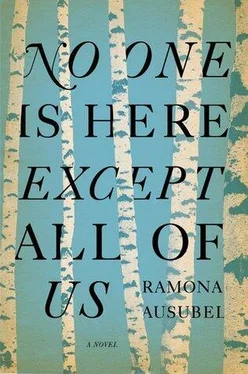The soldiers, dressed in torn green uniforms, spread out across the room, stumbling, pinching women’s cheeks and whispering greasy words. They smelled like someone was trying to preserve them in alcohol. Husbands raised their hands to slap the men away but the open mouths of guns talked them down. The biggest of the soldiers walked straight toward me, though he did not meet my eye. My heart crashed into my chest. Solomon cowered in a ball behind my back. I hoped I was big enough to hide him. The soldier kneeled in front of me and tucked a fallen lock of hair behind my ear. His breath was wretched. His eye sockets were deep pits and he smelled like alcohol, dirty hair and marsh water. At the slime of his touch, I reached up to wipe my face. “Brutta,” he cursed.
The soldier turned to Igor who, incredibly, slept on. “Prezioso,” he said, the word slithering out of his mouth like a snake hatching. He slid his big arms around Igor and picked him up. I screamed, put the baby, his cry like a saw, on the floor and tried to wrestle Igor back. The soldiers just laughed. The thought that Igor was going to wake up in some horrible man’s arms was like sharp glass being dragged through my chest. The big soldier, my husband in his arms like a child, spat at the floor by my feet and stumbled right through the door. The two smaller soldiers squeezed in a last assault. One punched the baker in the neck, kicked over the stranger’s stack of prayer books. The other knocked Vlad’s hat off his head. Then he fired a single bullet through the wall.
I started to run after them but the barber blocked my path. “That’s my husband,” I said, my voice full of hills and valleys. The barber made the shape of a pistol with his fingers because this was enough to quiet any fight he might have had in him. “Where are they taking him?” I asked.
The barber shook his head. “We don’t know who they are,” he said. “We don’t know anything.”
“That’s Igor,” I kept saying.
I looked to the stranger, because she was supposed to be the one who understood the horrors we were here to avoid. She shook her head and put a hand on her chest.
“They were from Italy!” Kayla announced. “I remember that language! Hersh had a grandmother who was from that seaside country, she was a silk trader, nice stuff that silk. Maybe we are related to that man!” She kept chattering, nervous and hysterical. I saw a flash of Igor wrapped up in a fabric so soft he might never wake up again.
“Where are they taking my husband?” I asked no one. All the no ones shook their heads. Solomon cried and was tackled by a pile of women, where he was met with so much comfort, so much soft singing, so many shushing bosoms, that his cries were snuffed out.
“We’re sure he will be returned,” everyone said, not at all sure.
“No one is going to help him?” I cried. “No one, no one?” My eyes ran around the room, but nobody stood up. We had become a fearful people, living on an island where we forgot how to defend ourselves. I had known the ache of a growing family — of adding mothers and fathers, husbands and sons; now the first subtraction bit me with jagged teeth.
I gathered my babies in my arms. The stranger followed me out under the eaves, beyond which waterfalls of rain were sheeting. “You are you. You still are,” she yelled over the downpour. At that moment, I was not comforted by the idea. I might happily have fallen out of my life and into someone else’s. I did not respond or turn to the stranger. She grabbed me hard on the shoulder. “Now say it to me,” she said. Solomon looked up at her and wrinkled his brow.
“What?” I asked.
“Tell me that I am myself. Tell me that I still am.” I had grown used to the stranger existing as an empty case. We all had. The city where she used to live, burned and tortured, returned to the world. Grass had grown over it. The children, the husband, the friends, walked that rubble as ghosts. They remembered the woman who was the opposite of a stranger to them. She was the opposite of a stranger to me too now. She was as familiar to me as my own reflection, showing me my own existence each time I questioned it. Until now, I had not considered that I might have the privilege of doing the same for her. “You still are,” I told her, and she closed her eyes.
“You have to survive to tell what happens,” the stranger said. “That’s your job now.”
I ran home through a torrent with my babies in my arms. Solomon said nothing. His eyelashes were studded with tears or rain. The wetted stones underfoot reflected a sluggish moon. My heels clicked and echoed — my path was no secret. From each corner, each crack between shops, I expected, almost hoped for, a pair of long arms, reaching for us. “Where are you?” I asked my husband. “Be here,” I pleaded. “Be home.”
At my door, our door, I could not turn the knob unless I put one of my children down, which I would not do. Solomon untucked his little hand from his coat pocket. He tried to reach the knob, but his arm was too short. “Put me closer,” he said. I leaned us down, the knob turned, the door opened. Igor was not inside. Somehow, that felt like the final answer. His not being in the house was the same thing as his being gone from existence. Off the face of the earth.
My heartbeat was incomplete, an unanswered question rising again and again in my chest. I understood how precious the last years had been, how still the surface of my life had become. Now the world was rotted and full of holes. Igor had been plucked as easily as an apple. Solomon and the new baby were even smaller, even more grabbable, and I knew that I myself could be traded. Igor’s space was open, and any man might decide he wanted to fill it, to save me, to do me the favor. War was a sick dog, teeth bared, the rope around his neck unraveling. A need began to rise up in me, and that need was to run.
Suddenly, someone tapped on my window. I jumped up to open it before I thought to be afraid. “Igor?” I asked. But it was not him. Fear knocked me across the head as the figure there reached bony fingers up to push its hood away. I slammed the window closed, but the latch was slippery and I could not get it in my grip. The figure tapped again. The window creaked open.
The hood fell away and the face came into the light. It was my real mother. My heart would not still — I had to lean against the wall to keep from falling. Perl drew her face close to mine and said, “Sometimes you think you’ve lost something but you’ve only shared it. ”
“You scared me,” I panted. She put her hand on her heart. “But sometimes you really have lost it,” I whispered back.
“You’ll see,” she said. Her hand, when she touched mine, was cracked and rough. She had not held it since I was a child, since I was her child. Her fingers were warm, in spite of the cold outside, and strong. I was still tremoring.
“Are we dying?” I asked Perl. She did not answer me. “Is the war coming? Is it here?” She did not answer again. “Why did you give me away?” I asked. “Why did you lock the door so I couldn’t come home?” I could have stood there asking questions without running out until the flood carried us all away.
“I never stopped being your mother.”
Together, we felt the weight of our small tribe lessen. We felt subtraction. “There is so much more to lose,” I said.
Perl reached into her pocket and took out a forbidden old object: a silver compass with a black face and a bright red needle. “I am always going to be in one of these directions,” she said. “No matter how big the map is, I’m on it somewhere.” As soon as she placed the compass in my hand, I realized the process of my leaving had already begun. Away. Our village was found, it was known and it was mapped. The only way to protect my children was to make us disappear. A person who does not exist cannot be tracked and she cannot be traded.
Читать дальше












